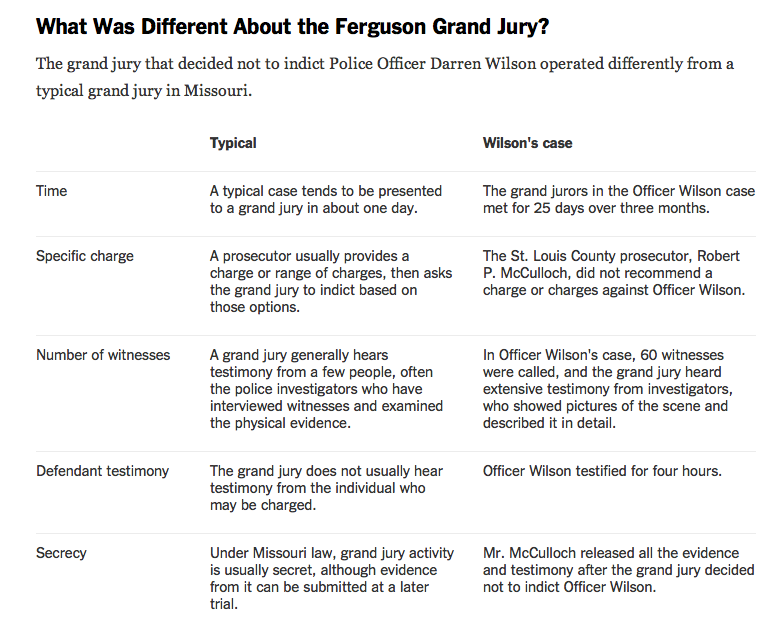By Liz
First, back in August, when news outlets reported that Bob McCulloch, the prosecutor for St. Louis County, had a long history of siding with the police; that his father, a St. Louis cop, was killed on the job by a black man; that his brother, uncle, and cousin were cops as well; that his mother had worked as a clerk in police headquarters; that he himself had wanted to be a cop until one of his legs was amputated in high school. His office would be responsible for presenting the case of Darren Wilson, a Ferguson cop who shot and killed Michael Brown, before a grand jury.
Is this a joke?
And then when McCulloch said he would let the jury of 12 civilians figure out what charge to bring, if any, instead of making a case for a specific charge, as prosecutors usually do. And instead of selecting a few key witnesses and experts to testify, he would give them “every last scrap of evidence”—essentially drowning them information that they did not have the skills to parse. As former federal prosecutor Alex Little told Vox, “So when a District Attorney says, in effect, ‘we’ll present the evidence and let the grand jury decide,’ that’s malarkey. If he takes that approach, then he’s already decided to abdicate his role in the process as an advocate for justice. At that point, there’s no longer a prosecutor in the room guiding the grand jurors, and—more importantly—no state official acting on behalf of the victim, Michael Brown.”
Is this a joke?

Everything the Darren Wilson grand jury got wrong: The lies, errors and mistruths that let Michael Brown’s killer off the hook
The prosecutor's document dump was designed for transparency. It shows how transparently flawed the process was
By Paul Rosenberg
“The biggest thing that jumps out is prosecutors who aren’t prosecuting,” Bloom said, “prosecutors who let the target of the investigation come in, in a very friendly, relaxed way, and simply tell the story. There is absolutely zero cross-examination. Cross-examination is the hallmark of our system, it’s the crucible of truth. And I don’t say that to use flowery language. That’s how we get at the truth.”
Before she read the transcripts, Bloom noted, “I suspected that he wasn’t cross-examined, instead he was just allowed to talk in a narrative and tell a story and in fact, that’s exactly what happened,” which is a lawyer’s way of saying what the woman in Starbucks told Zach Roth—the prosecutors were treating Wilson like he was their witness, helping them make their case against the accused—Michael Brown. They were not treating him like a suspect or defendant, or even a witness for the other side. They were treating him like one of their own—which, of course, is exactly what he was. And that’s the basic problem, in a nutshell.
While McCulloch had gone out of his way to paint all the witnesses against Wilson as unreliable, offering confused and contradictory testimony, Bloom zeroed in on the most obvious contradiction provided by Wilson himself. “Darren Wilson, as you can see in these pictures, doesn’t have any obvious injuries, maybe, if you look really closely, a tiny bit of pinkness on his face,” Bloom said. “That is completely inconsistent with his story that Mike Brown, with full force, he says, punched him twice, solidly in the face—big, strong Mike Brown. Inconsistent with his injuries, he’s not cross-examined about that, or about anything else.”
That was hardly the only example Bloom cited on air that day. “There are so many parts of that transcript that jumped out at me as a trial lawyer that I would want to cross examine him about if I were the prosecutor,” Bloom said.

Justice Scalia Explains What Was Wrong With The Ferguson Grand Jury
By Judd Legum
In contrast, McCulloch allowed Wilson to testify for hours before the grand jury and presented them with every scrap of exculpatory evidence available. In his press conference, McCulloch said that the grand jury did not indict because eyewitness testimony that established Wilson was acting in self-defense was contradicted by other exculpatory evidence. What McCulloch didn’t say is that he was under no obligation to present such evidence to the grand jury. The only reason one would present such evidence is to reduce the chances that the grand jury would indict Darren Wilson.

More evidence of mistakes
Failing to indict someone is incredibly rare:
It’s Incredibly Rare For A Grand Jury To Do What Ferguson’s Just Did
The police as well as the prosecutor handled the Brown case badly:
Ferguson Grand Jury Evidence Reveals Mistakes, Holes In Investigation
More thoughts on what the outcome says about our flawed and biased justice system:
“Something is very, very wrong”: Why Ferguson exposes our system of justice
White supremacy lives on: Ferguson decision confirms absence of legal and moral justice
Comment: For more on Ferguson, see Wilson's Testimony in Ferguson Shooting and Killing Blacks = "Perfect Crime."



No comments:
Post a Comment